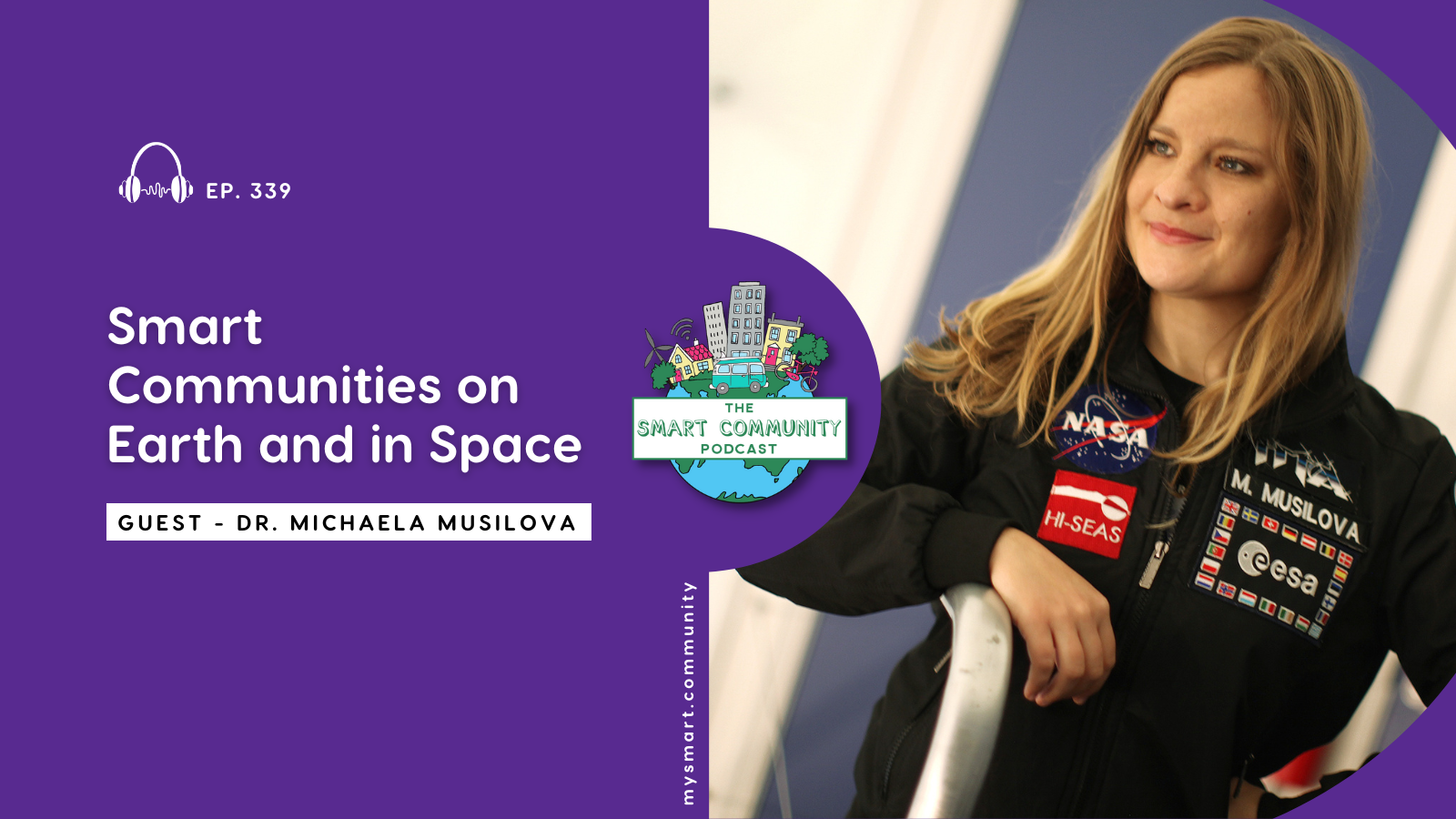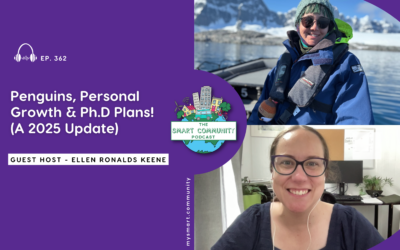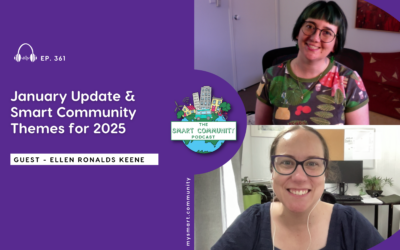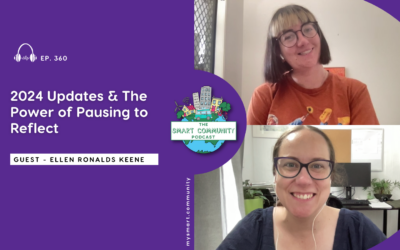Hi #SmartCommunity friends! Welcome back to another episode of the Smart Community Podcast. In this episode I have a fascinating conversation with Dr. Michaela Musilova, an astrobiologist, speaker, analog astronaut and author. Michaela has been conducting space-related research at institutions around the world and was the Director of HI-SEAS and Commander of over 30 simulated missions to the Moon and Mars, in collaboration with NASA, ESA and many international organizations. She is currently a visiting Professor at the Slovak University of Technology, Global Faculty at the International Space University and Head of Research of the space technology company NEEDRONIX. She also writes articles for Space.com and co-authored her biography, A Woman from Mars.
In this episode, Michaela tells us about her passion for space and for life on earth, how she got into this Space space, and some of the challenges she has overcome to pursue this dream. She tells us about why it’s so important to share with the public how science is helping humanity and how diversity and also food have both been key to the success of the missions she’s been involved with.
Michaela then tells us about the projects she’s worked on, including the Astro Seven Summits, which is focused on performing research related to life in space and also on extreme environments on earth. Michaela and I talk about how to link space exploration science with climate change, as well as what she thinks will happen on the first missions of humans living on Mars.
We then discuss the emerging trend of commercial investment in space and especially in things like rockets, but why it’s not just rockets that make successful missions. Michaela shares with us her concerns about the commercial space race potentially taking unnecessary risks for the sake of meeting goals and boosting egos.
We finish our chat talking about whether there really is life on other planets, and Michaela tells us what she thinks about the likelihood of finding it. As always we hope you enjoyed listening to this episode as much as we enjoyed making it.
Listen here:
What we cover in this episode:
- Michaela’s background in astrobiology and her passion for space, the universe, humans and life on earth
- What a Smart Community means to her
- How Michaela got into this Space space and some of the challenges she’s had to overcome to pursue this dream
- Why it’s so important to share with the public how science is helping humanity
- How Michaela has taken what she learned abroad back to her home country of Slovakia to help engage the community and government to support the space sector there
- About the HI-SEAS project Michaela is working on and what has surprised her from the missions
- The importance of diversity for success of the missions
- Why food became central to the happiness of crew on missions
- About the Astro Seven Summits project that is researching life in space and on extreme Earth environments
- The public education and outreach surrounding Astro Seven Summits expeditions to help the public understand a bit about the research and how they can participate too
- Why we need to link space exploration science with climate change and how to do that
- What Michaela thinks will happen on the first missions of humans living on Mars
- The emerging trend of commercial investment in space and especially in things like rockets, but why it’s not just rockets that make successful missions
- Michaela’s concerns about the commercial space race potentially taking unnecessary risks for the sake of meeting goals and boosting egos
- The questions of whether there is life on other planets
Quotes:
“This question that humanity has had for centuries and millennia and we still don’t know the answer to: is there other life in our solar system and beyond? How did life originate here? And can we humans live somewhere beyond Earth? We still don’t have the answers to it but we’ve gotten so much closer to answering them and narrowing some possibilities down, which I find very fascinating.”
“In many ways, it was like living my childhood dream. I got to do both astrobiology research, but also to go around wearing a spacesuit and living as if I were on another planet.”
“Along the way, I also realised just how important it is to do outreach, to talk about what I do with the public, both to share knowledge, but also to motivate people to follow their dreams, even though there are many obstacles in the way. And also, I feel a responsibility as a scientist to tell people what money invested into science is going towards and how it’s actually helping humanity. And hopefully, it’ll also open their eyes to how science is very useful. And especially in this day and age, with climate change, and all these things happening, we really need to be able to work with the public much more as scientists and help make this world a better place.”
“What always surprises me in the end [is] the humans. You think that the kind of interactions would be similar with every mission and even kind of the data we get from all of them would have a certain pattern, but really every person is so different…And the thing I discovered, by doing a lot of these missions and by on purpose making the crews be as diverse as possible, is that actually diversity is one of the keys to success of these missions.”
“The more diverse the crew, the more successful the mission was. And that is not something that was expected at first, and I think some of my colleagues thought that, on the contrary, if people are too different from one another, it’s very likely going to cause issues. But actually, people end up learning so much from one another, that it actually created great bonds between the crew members.”
“What’s very likely to happen is that for the first missions [of humans living on Mars], we can’t rely on all the technology to work well, and for food to grow fast in a greenhouse or something. So the crews are going to have to bring a lot of food with them as a backup in case things go wrong.”
“An important part is the outreach and education. So to communicate about all these things that I’m doing, explain to the public, why I’m doing it, what I’m seeing, what I’m learning from these expeditions, and what they can do to contribute to the project.”
“One important thing to realise is that many of us who work in the space sector, we’re not just looking at going to the Moon and Mars as a separate plan. Like, ‘Oh, we’re just escaping to another planet and leaving Earth behind.’ But actually, a lot of the work in the space sector is focused on Earth.”
“I’m a little bit concerned that some people may be more worried about their ego, and achieving certain goals and willing to take on risks that simply shouldn’t be allowed. And that is why things take so long in the space sector because you have to account for a huge amount of risks and bad things that could happen.”
“The chances for at least some simple life to exist out there are pretty huge. If we’re talking about more complex life, that’s a whole other matter. And I still think the chances for that are pretty high. But whether we’re going to find something that’s similar to us, or that can communicate with us, that is definitely a whole other story. And chances are much lower, but you never know.”
Connect:
Follow her on LinkedIn and Facebook, or on Instagram and Twitter @astro_michaela
Connect with me via email: hello@mysmart.community
Connect with My Smart Community via LinkedIn or Twitter and watch on YouTube
Podcast Production by Perk Digital






0 Comments